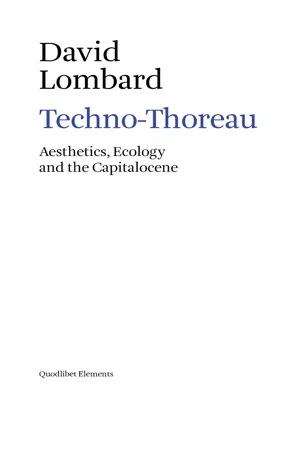
- English
- ePUB (mobile friendly)
- Available on iOS & Android
About this book
EN. This essay serves the double purpose of investigating the aesthetic dimensions of Thoreau's environmental philosophy while examining the philosophical and political implications of its capacity to break down the boundaries between the natural and the technological landscape. Deeply rooted in an Emersonian transcendentalist tradition viewing nature as an organized and holistic "whole, " Thoreau's ecophilosophy seeks to reconcile the idealistic pole with the empirical pole in its approach to natural and technological landscapes, objects and situations. Consequently, this book starts by considering Thoreau as a "techno-author" who does not shun from embracing technological change in the Romantic period and proceeds to develop an alternative, proto-ecocritical form of the aesthetic of the sublime. It also calls for a reconsideration of Thoreau's poetics and its legacy against the background of the "toxic sublime, " which sheds a new light on the methods and purposes of ecocriticism as well as on recent trends in environmental (non)fiction.IT. Questo saggio si propone il duplice scopo di studiare la dimensione estetica della filosofia ambientale di Thoreau e di analizzare le implicazioni filosofico-politiche della sua capacità di abbattere i confini tra paesaggio naturale e paesaggio tecnologico. Profondamente radicata nella tradizione trascendentalista di Emerson, che vede lo spazio naturale come un "tutto" organizzato e olistico, l'eco-filosofia di Thoreau cerca di riconciliare – con il suo approccio ai paesaggi naturali e tecnologici, agli oggetti e alle situazioni – il polo idealistico e il polo empirico. Pertanto, questo libro inizia prendendo in considerazione Thoreau come "tecno-autore", che non si rifiuta di accettare i cambiamenti tecnologici verificatisi nel periodo romantico, ma sviluppa una forma alternativa e proto-ecocritica dell'estetica del sublime. L'autore cerca anche di riesaminare la poetica di Thoreau e la sua eredità sullo sfondo del "sublime tossico", gettando così nuova luce sui metodi e sulle finalità dell'ecocritica, nonché sulle recenti tendenze della (non)fiction ambientalista.
Frequently asked questions
- Essential is ideal for learners and professionals who enjoy exploring a wide range of subjects. Access the Essential Library with 800,000+ trusted titles and best-sellers across business, personal growth, and the humanities. Includes unlimited reading time and Standard Read Aloud voice.
- Complete: Perfect for advanced learners and researchers needing full, unrestricted access. Unlock 1.4M+ books across hundreds of subjects, including academic and specialized titles. The Complete Plan also includes advanced features like Premium Read Aloud and Research Assistant.
Please note we cannot support devices running on iOS 13 and Android 7 or earlier. Learn more about using the app.
Information
BIBLIOGRAPHY
Table of contents
- CONTENTS
- THOREAU AND THE TECHNO-NATURAL LANDSCAPE
- DECONSTRUCTING THE NATURAL SUBLIME
- THOREAU, CAPITALISM AND THE TECHNOLOGICAL SUBLIME
- TOXIC MECHANIZATION: SENSES AND ENVIROMENT
- TOXIC WASTE: SELF AND ENVIROMENT
- POST-THOREAUVIANISM AND ECOCRITICISM
- BIBLIOGRAPHY
- ABSTRACT
- BIOGRAPHY